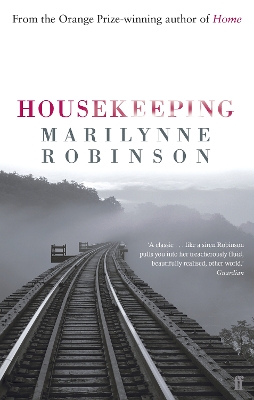Reviewed by gmcgregor on
Sylvie is...a drifter, to be polite. She's actually more of a hobo. She likes the girls, loves them in her own way even, but it's hard for her to create a stable home for them. She can't break out of old habits: riding around in train boxcars, falling asleep with her shoes still on in case she needs to be able to move along, hoarding. While Ruth takes after her aunt, Lucille doesn't. As the girls enter the teenage years, Lucille wants normality. She breaks away from the family, and as she talks about what's going on back home, outside interest increases dramatically. This strains things to the breaking point and forces Ruth to make a decision about who she really is and who she really wants to be.
The more I read, the more I boil books down to three essential elements: plot, characters, and writing. A good book has two, a great book has all three. Robinson's writing is lovely, her prose clear and insightful and strong. But the other two legs of this stool aren't really there. Despite being told from Ruth's perspective, we never get much of a sense of who she really is. Her sister, despite being her closest companion, doesn't get much development either apart from wanting a more conventional life. Even Sylvie is elusive, even though you get a better sense of her than you do almost anyone else. As for the plot...despite being a coming-of-age novel, it seems almost more like a failure-to-come-of-age novel. Ruth never really grows or changes. She just...drifts along, like a leaf along a river. A rootless child, she follows her rootless aunt/guardian. Even her break with her sister, what should have been a deeply traumatic experience, feels anticlimatic and muffled, somehow. Since there was quite a long gap between this book, published in the 80s, and Robinson's next work, Gilead, not published until the early 2000s, I'm still interested in reading more of her works. Maybe that long gap helped her develop a better sense of people or plotting? This book, though, isn't quite good enough to recommend.
Reading updates
- Started reading
- 10 March, 2017: Finished reading
- 10 March, 2017: Reviewed
